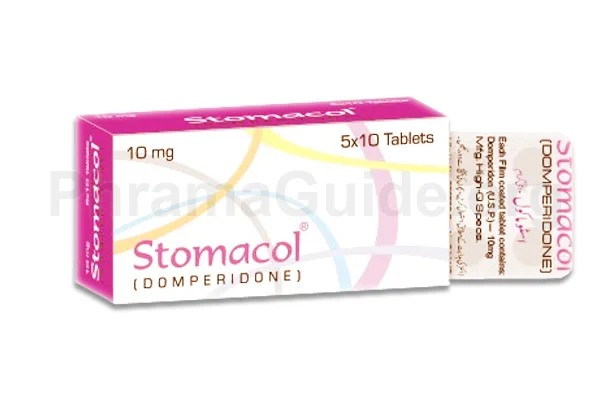Stomacol tablet is primarily used to treat nausea and vomiting, as well as other gastrointestinal conditions. It belongs to a class of drugs called dopamine antagonists. Following are some common and off-label uses of Stomacol tablet:
Common Uses of Stomacol Tablet
Treatment of nausea and vomiting: Stomacol Tablet is used to treat nausea and vomiting caused by a variety of factors, including:
- Gastroenteritis: Inflammation of the stomach and intestines, often caused by a viral or bacterial infection.
- Migraine headaches: Severe headaches that can be accompanied by nausea and vomiting.
- Chemotherapy: Stomacol tablet is used for nausea and vomiting, caused during cancer treatment.
- Medications: Certain medications, such as opioids and some antibiotics, can cause nausea and vomiting as a side effect.
Treatment of Gastroparesis: Gastroparesis is a condition characterized by delayed stomach emptying, leading to symptoms such as nausea, vomiting, bloating, and early satiety. The use of Stomacol can help stimulate gastric motility, facilitating the movement of food through the digestive system and relieving symptoms of gastroparesis.
Relieving Reflux Symptoms: Stomacol can be used to manage symptoms of reflux, where stomach acid flows back into the esophagus, leading to heartburn, regurgitation, and discomfort. It helps improve the movement of food from the stomach to the intestines, reducing reflux symptoms.
Off-label Uses of Stomacol Tablet
- Irritable Bowel Syndrome (IBS): In some cases, Stomacol may be used off-label as an adjunct therapy to alleviate symptoms of irritable bowel syndrome, such as bloating, abdominal discomfort, and irregular bowel movements. It can help regulate gastrointestinal motility.
- Breast Milk Production: Stomacol may be prescribed off-label to stimulate milk production in breastfeeding women who have an insufficient milk supply. Using Stomacol Tablet helps to increase the release of prolactin, a hormone involved in milk production.
- Cyclic Vomiting Syndrome: Cyclic vomiting syndrome is a disorder characterized by recurrent episodes of severe nausea and vomiting. Stomacol may be used off-label to help manage and prevent these episodes by improving gastric motility.
- Functional Dyspepsia: Functional dyspepsia refers to recurring indigestion symptoms without an identifiable cause. Stomacol may be prescribed off-label to relieve symptoms such as abdominal pain, bloating, and early satiety by enhancing gastrointestinal motility.

What is Stomacol?
Stomacol is one of the leading brands of Domperidone, manufactured and marketed by High-Q Pharmaceuticals (Pvt) Ltd, Pakistan.
Stomacol Alternatives : Other Similar Brands
The following are some available similar brands that can be used as an alternative Stomacol:
- Motilium : Janssen Pharmaceutica.
- Pelton V : Global Pharmaceuticals (Pvt) Ltd, Pakistan.
- Peridone : Sami Pharmaceuticals (Pvt) Ltd, Pakistan.
- Vomilux : Atco Laboratories, Pakistan.
- Domel : Barrett Hodgson Pakistan (Pvt) Ltd.
- Emiset : Platinum Pharmaceuticals (Pvt) Ltd, Pakistan.
- Domflash : Next Pharma (Pvt) Ltd, Pakistan.
- Nomit : Le Mendoza Pharmaceuticals (Pvt) Ltd, Pakistan.
- Emidone : Pharmix Laboratories (Pvt) Ltd.
- Millium : English Pharmaceuticals Industries.
Stomacol : Available Formulations and Strengths
Presently, Stomacol is available in Tablet Form with the following strength.
Stomacol Tablet : 10mg strength.
Who Should Not Use Stomacol?
Stomacol has several contraindications, which are specific situations or conditions where the use of Stomacol is not recommended due to the potential risks outweighing the potential benefits.
- Hypersensitivity: Stomacol is contraindicated in individuals who have a known hypersensitivity or allergy to the medication or any of its components. Signs of hypersensitivity may include rash, itching, swelling, severe dizziness, or difficulty breathing.
- Prolactinoma or Hyperprolactinemia: Stomacol is contraindicated in individuals with a history of prolactinoma (prolactin-secreting tumor in the pituitary gland) or those with hyperprolactinemia (excessive levels of prolactin in the blood) due to the medication’s ability to stimulate prolactin release.
- Gastrointestinal Hemorrhage, Obstruction, or Perforation: Stomacol is contraindicated in individuals with gastrointestinal hemorrhage (bleeding), obstruction (blockage), or perforation (rupture) due to the potential exacerbation of these conditions.
- Moderate to Severe Hepatic Impairment: Stomacol should be used with caution in individuals with moderate to severe liver impairment, as it may affect the metabolism and elimination of the medication. In such cases, the dosage may need to be adjusted, or alternative treatment options may be considered.
- QT Prolongation and Significant Cardiac Conditions: Stomacol is contraindicated in individuals with known QT prolongation (a heart rhythm disorder) or those taking medications that can prolong the QT interval. It is also contraindicated in individuals with significant cardiac conditions or a history of cardiac arrhythmias.
What is the Recommended Daily Dosage of Stomacol?
Stomacol Dose for Gastroparesis:
- 1 to 2 tablets of 10mg, three to four times a day, before meals and at bedtime.
- The maximum daily dose should not exceed 80mg (8 Tablets of Stomacol).
Stomacol Dose for Nausea and Vomiting:
- 1 to 2 tablets of 10mg, three to four times a day, before meals and at bedtime.
- The maximum daily dose should not exceed 80mg (8 Tablets of Stomacol).
Stomacol Dose for Stimulating Breast Milk Production:
- One Tablet of 10mg, three to four times a day.
- The duration of treatment may vary depending on individual response and specific circumstances.
How Stomacol Works?
Stomacol acts as a selective antagonist, specifically blocking dopamine D2 receptors. By blocking these receptors in the GI tract, it inhibits the inhibitory effect of dopamine on gut motility and increases gut motility. This leads to enhanced movement of food through the stomach and intestines.

Leave A Comment